Table of Contents
Share this article
Learn from the brightest minds how to predictably and efficiently grow revenue.
Related Content
5 Ways to Use the Ebsta Integration With HubSpot to Improve Sales Performance
How to improve adoption of HubSpot with Ebsta
B2B Sales Benchmarks: 2023 H1 Update
The latest update from the 2023 B2B Sales Benchmarks analysis of over $37bn in pipeline.
How to improve AE quota attainment (according to data)
23% of reps are contributing 83% of revenue. Here's how to solve it (with data)
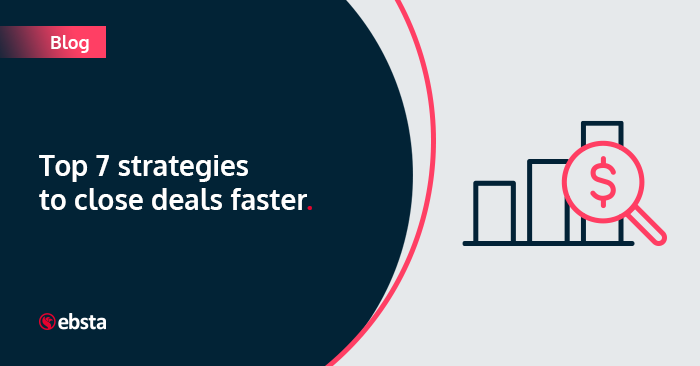
Top 7 Strategies To Close Deals Faster
With time-killing deals and prospects equipped with more information than ever before, closing a sale has become somewhat of a dark art.
Close more deals faster with these 7 strategies!
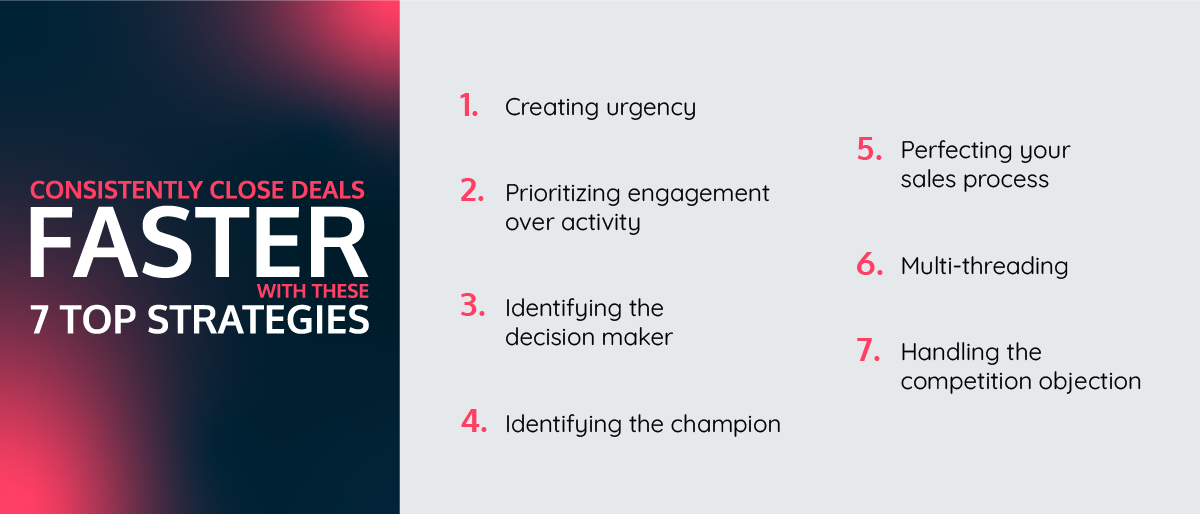
Table of Contents
Creating urgency = identifying pain points and providing solutions
Only 61% of salespeople feel they are good at identifying customers’ pain points.
Those who identify pain points are 28% more likely to close the sale and hit the quota. – Sales Management Association
The best way to create a sense of urgency is to highlight the prospects’ problems.
- Are their time and resources being wasted?
- How does your product save their business time and resources?
For example, your product could save up to 7 hours of time for your prospect or improve the efficiency of their processes.
This is the kind of stuff you want to lead with as it highlights the negative impact it is having on your prospects’ business and aggravates the cost of their pain.
Utilizing a sales methodology like MEDDPICC can elevate your value proposition because it gives you a deeper understanding of your client.
You can identify your prospects’ pain points by looking at similar deals you have previously won and recapping their pain points.
You will be able to see which companies have similar pain points and then extract learnings that can be leveraged to tailor the way you present your solution.
Prioritize engagement over activity metrics
Quality over quantity!
Deals with high levels of engagement are more likely to close as you have built and nurtured relationships within that account.
High engagement is not just building strong relationships but also having them with the right contacts (economic buyer and the champion). More on these below.
Key activities consider the number of calls, emails, and meetings booked.
Key activities do not take into account the direction of the activity (inbound/outbound), the duration of the activity, or the recency of the activity.
Whereas engagement considers all these factors as well as key activities.
Engagement gives you a more holistic snapshot of the quality of the relationship with the account. Highly engaged deals closed successfully 50% of the time.
Prioritizing engagement helps you to let go of deals held in hope and focus on deals that are more likely to close.
Identify the decision maker
Many salespeople spend a lot of time speaking to the wrong person regarding a deal and after many hours realize this person does not call the final shots.
The decision maker in the MEDDPICC criteria is known as the economic buyer and this person can make or break your deal.
It can be easy to over or under-qualify an economic buyer so here are the criteria you should be looking out for
- If they are signing the contract
- They have veto power (can override the champion)
- Main focus is on the strategy of the organization
- Access to discretionary funds that are not budgeted
Identifying your champion
A champion is someone who has a vested interest in the success of your product.
If the product performs well, you both win.
If not, you both lose.
They act as an internal seller on your behalf and usually have influence and power over business decisions.
Therefore, no champion, no deal.
- Do they have power over the sales cycle?
- Do they act as an internal seller for you?
- Do they have a vested interest in your product succeeding?
Identifying the decision maker and champion helps you to close deals faster because these people assist you in building your business case around the value of your solution.
Perfect your sales process at all 7 stages
Understanding historical data and where things are going right or wrong can help you to fine-tune your processes.
Spotting where deals are slipping and salvaging those opportunities = closing more deals faster.
- Analyze your historical data
- Deep-dive into rep performance to learn from the best performers and better support your sales reps
- Benchmark the results to discover what factors have the biggest impact on your win rates and sales cycle
- Understand your ICP and begin to target them
- Pipeline generation is improved
- Sales velocity improves so you can close more deals in a shorter period of time
- Better pipeline management results in improved forecasting accuracy
Watch this space in the upcoming weeks so you can understand each of these steps in more detail and perfect your sales process.
Multi-threading
According to Brent Adamson, co-author of The Challenger Sale and The Challenger Customer, the average number of stakeholders involved in a purchasing decision is 6.8.
This means you must ensure you are building relationships with every relevant key stakeholder. Cue – multi-threading.
Multi-threading is the process of building relationships with several key stakeholders in an account.
It works both ways so that your prospect is also in contact with several people in your business.
Now, for example, if someone from the account leaves their job, you still have several other people on the account pushing the deal forward.
91% of the top performing sales organizations collaborate across all departments to close big deals – Miller Heiman
Learn the ins and outs of what separates you from your competitors
15% of salespeople say differentiating their product is the biggest challenge to closing – The Richardson Selling Challenges Study
Taking the time to qualify and build a relationship with your prospect should give you everything you need to be able to address any objection thrown your way.
Qualification gives you a deep understanding of why your product is a good fit for your prospect and instills confidence within them.
Here are some examples of the insights you should have on your competitor:
- Competitor price points
- How they market their product
- Their unique selling points
- What is their customer service like?
Employing the SWOT analysis method can help you to prepare for objections and better understand what separates you from your competitors.
S – build on strengths
W – minimize weaknesses
O – seize opportunities
T – counteract threats
Anticipating and objection handling is a skill.
When you address all their concerns and objections out of the gate with ease, this will make your business stand out from the crowd.
Top tips from our very own sales team at Ebsta
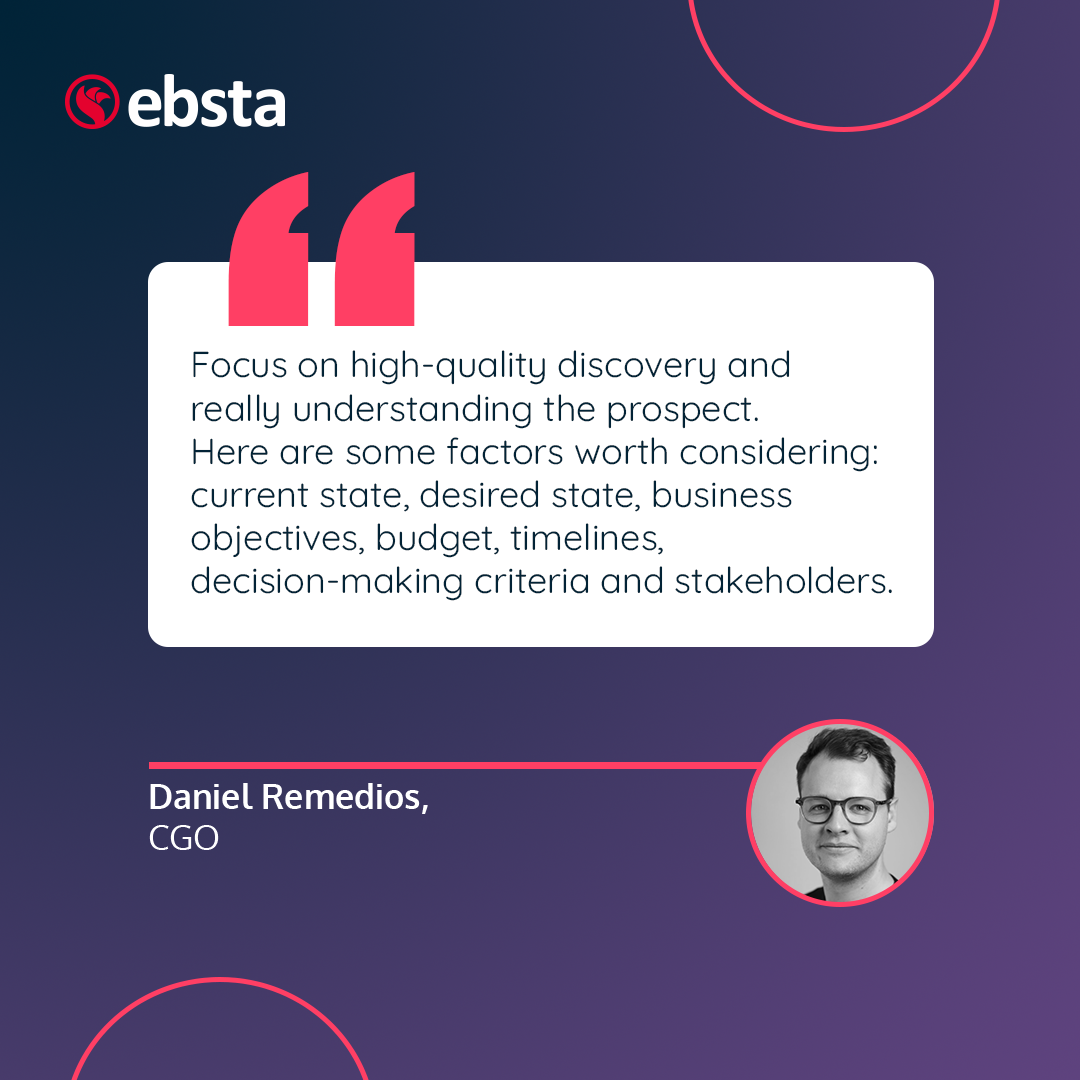
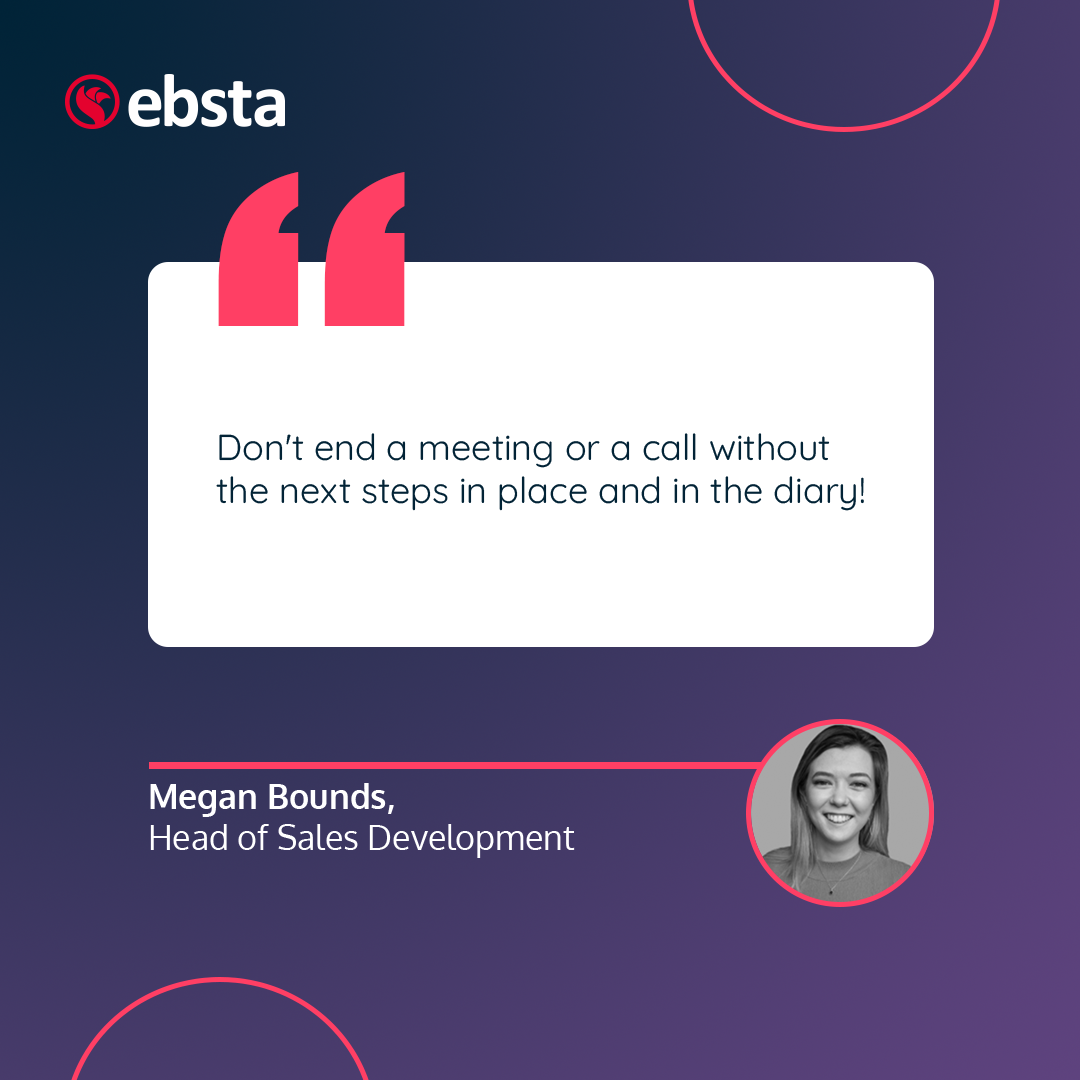
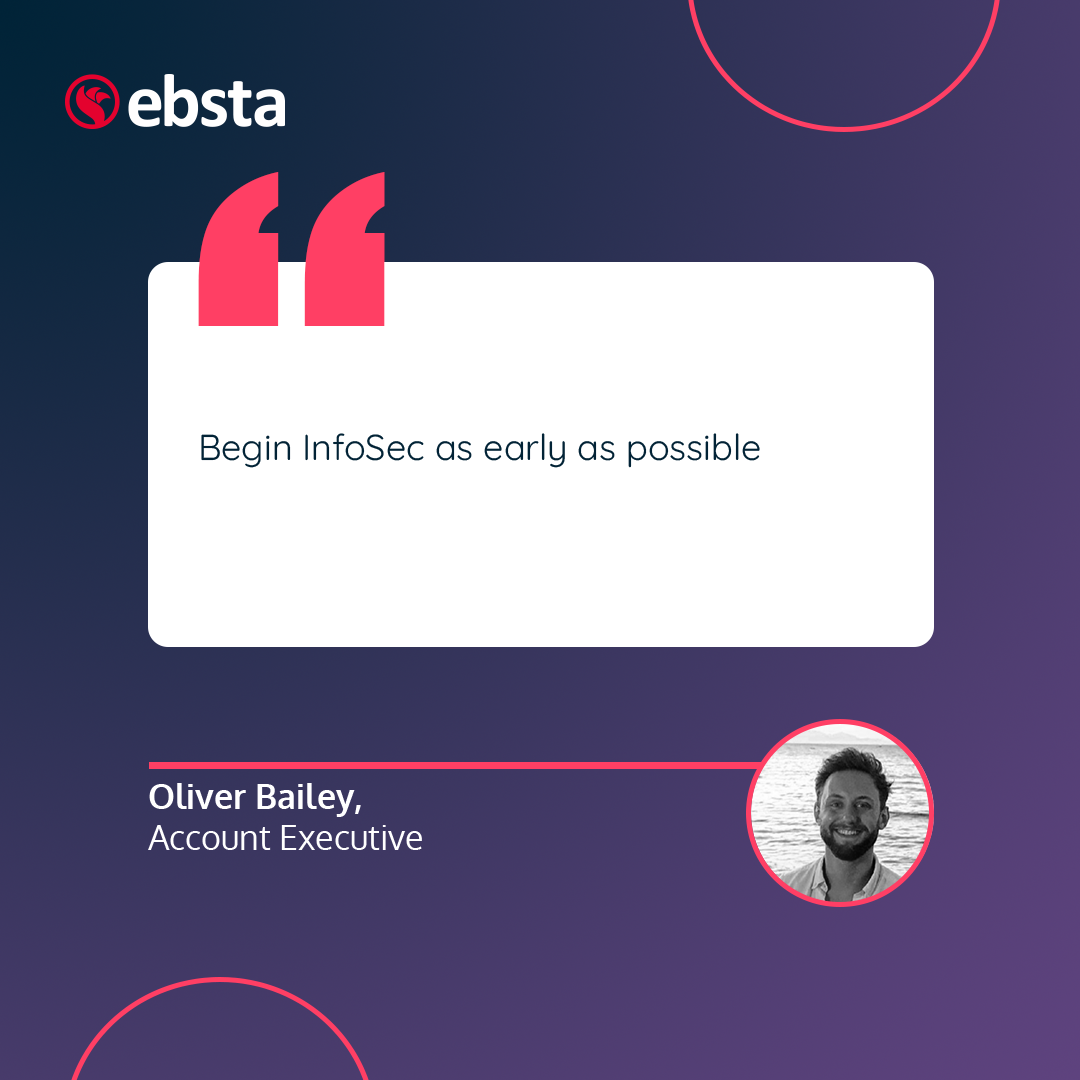
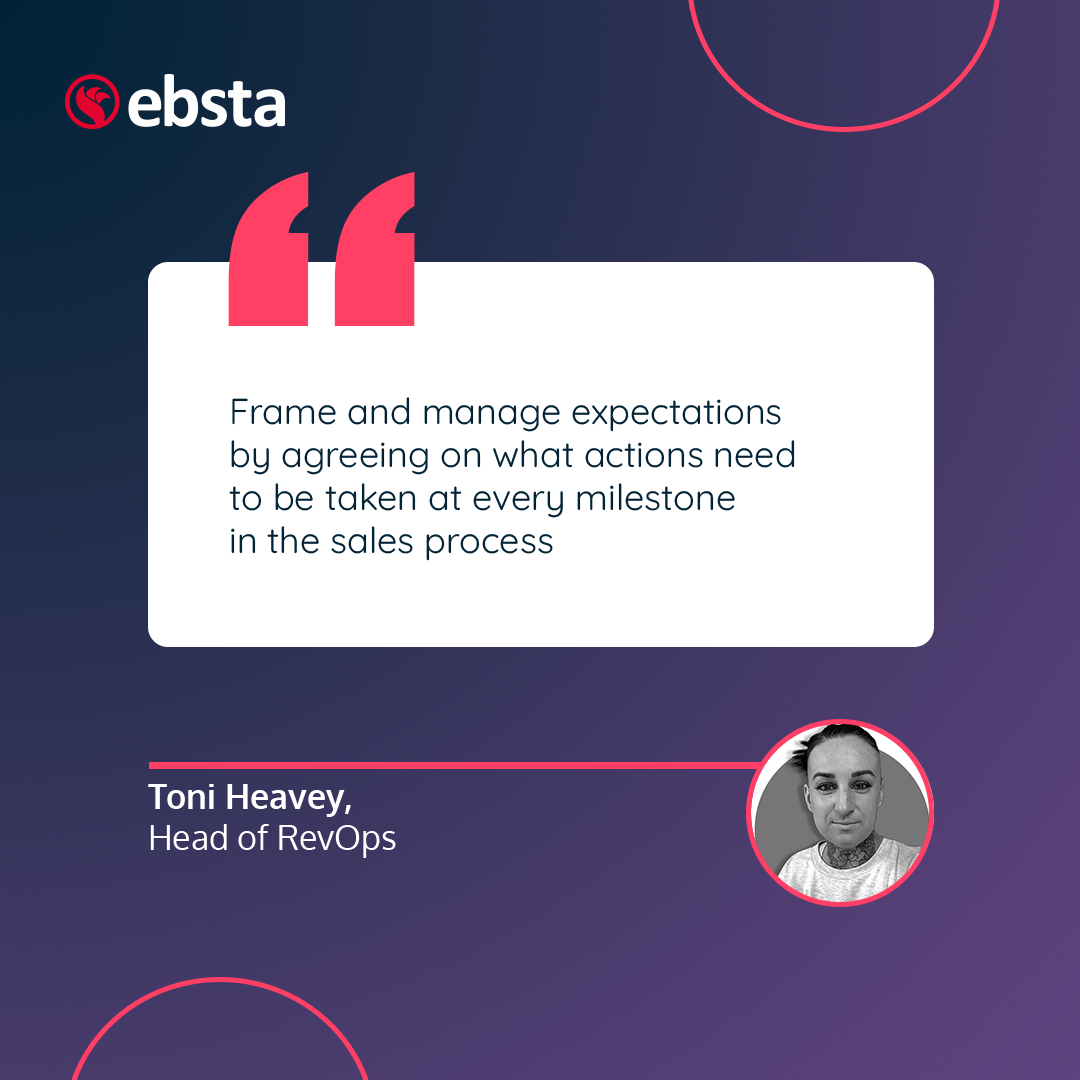
In conclusion:
- Time kills deals so momentum is key
- Save your time and resources by building relationships with the right people at the right time
- Perfect your sales process so no deal can slip through the cracks. How?
- By unlocking our ultimate guide on sales pipeline management best practices today to stay ahead of the curve.


